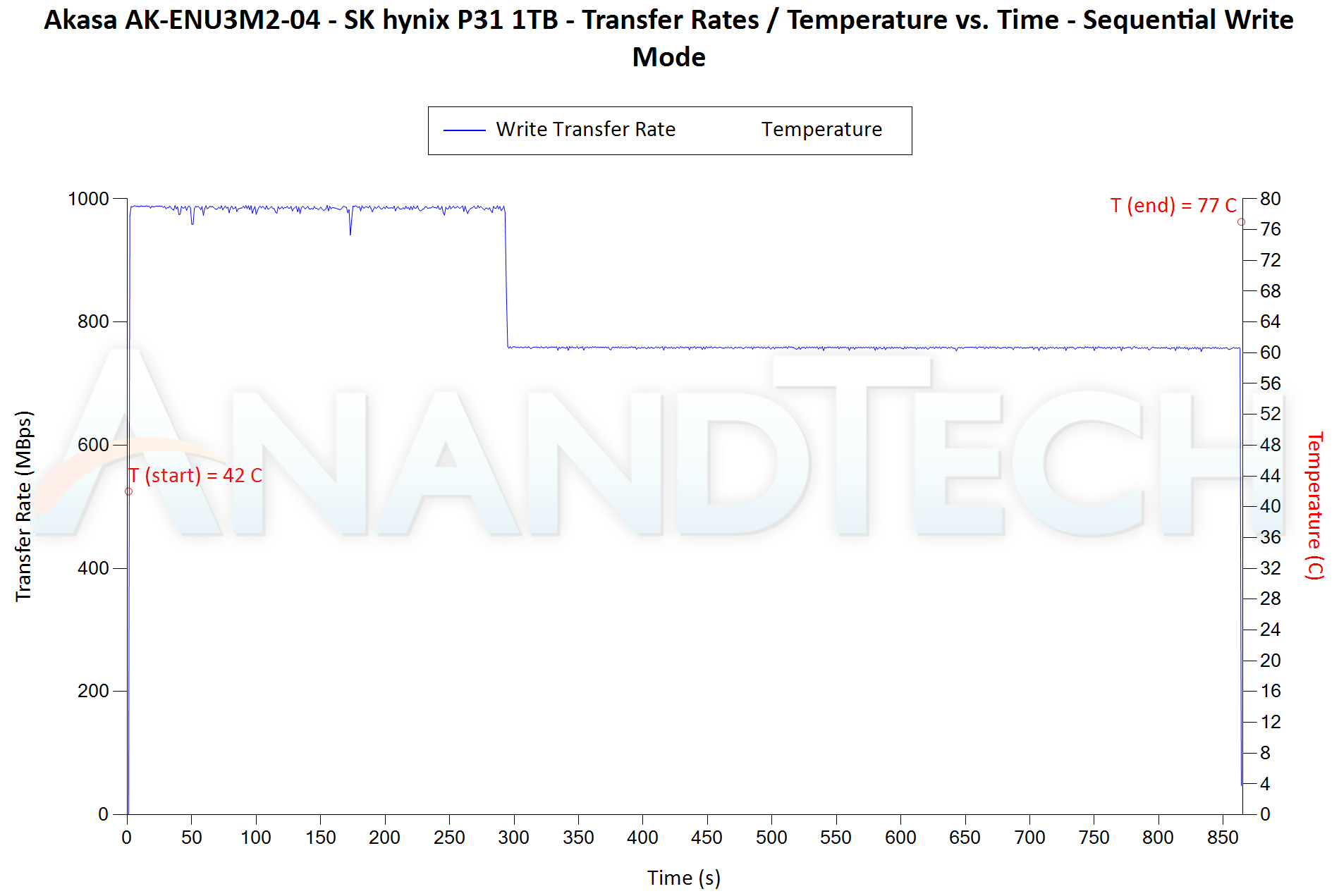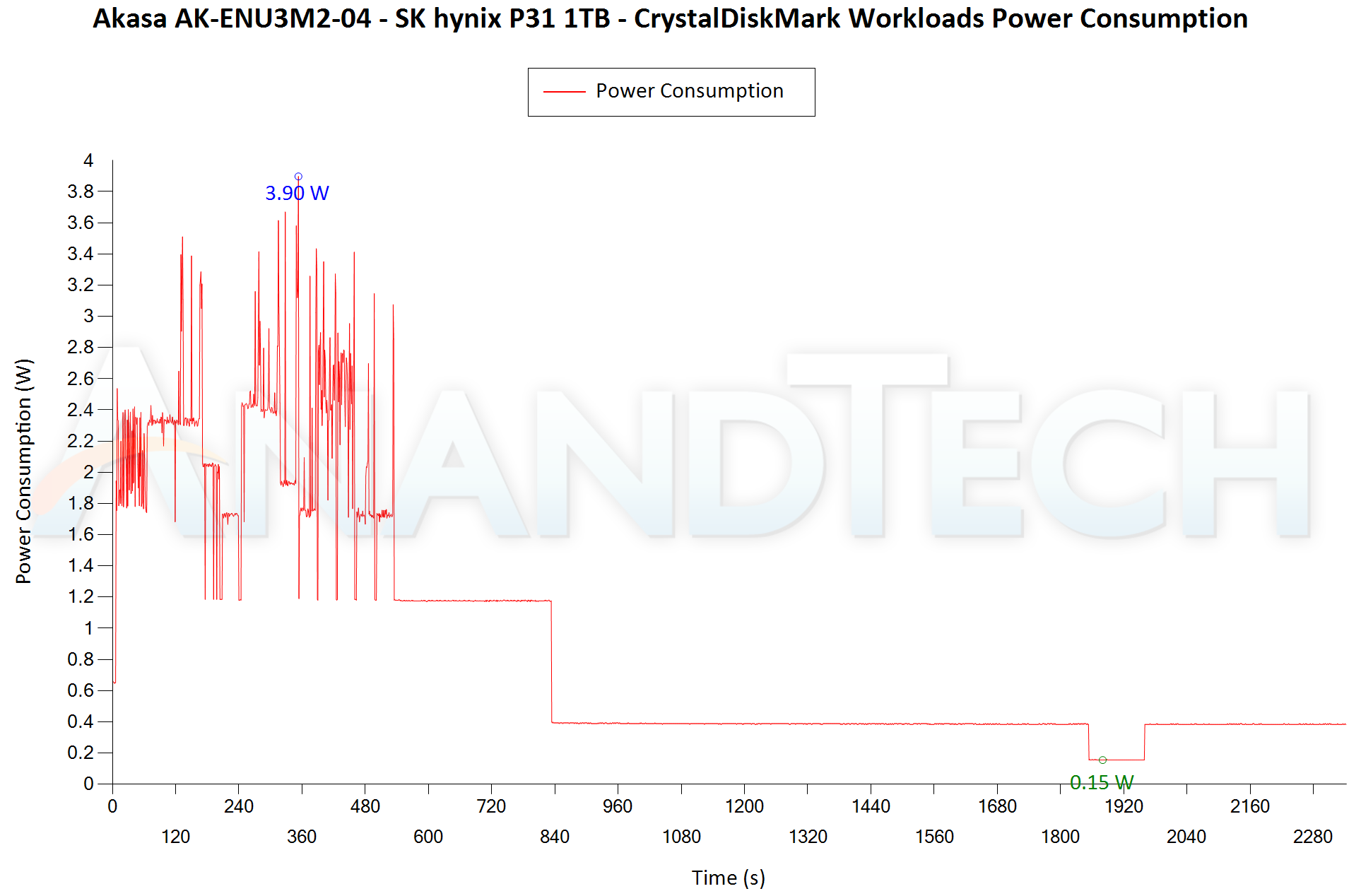OWC Envoy Pro Elektron Rugged IP67 Portable SSD Review
by Ganesh T S on October 29, 2021 9:30 AM EST- Posted in
- Storage
- SSDs
- OWC
- Phison
- DAS
- ASMedia
- External SSDs
- USB 3.2 Gen 2
- Portable SSDs
Miscellaneous Aspects and Concluding Remarks
The performance of the OWC Envoy Pro Elektron in various real-world access traces as well as synthetic workloads was brought out in the preceding sections. We also looked at the performance consistency for these cases. Power users may also be interested in performance consistency under worst-case conditions, as well as drive power consumption. The latter is also important when used with battery powered devices such as notebooks and smartphones. Pricing is also an important aspect. We analyze each of these in detail below.
Worst-Case Performance Consistency
Flash-based storage devices tend to slow down in unpredictable ways when subject to a large number of small-sized random writes. Many benchmarks use that scheme to pre-condition devices prior to the actual testing in order to get a worst-case representative number. Fortunately, such workloads are uncommon for direct-attached storage devices, where workloads are largely sequential in nature. Use of SLC caching as well as firmware caps to prevent overheating may cause drop in write speeds when a flash-based DAS device is subject to sustained sequential writes.
Our Sequential Writes Performance Consistency Test configures the device as a raw physical disk (after deleting configured volumes). A fio workload is set up to write sequential data to the raw drive with a block size of 128K and iodepth of 32 to cover 90% of the drive capacity. The internal temperature is recorded at either end of the workload, while the instantaneous write data rate and cumulative total write data amount are recorded at 1-second intervals.
| Sequential Writes to 90% Capacity - Performance Consistency | |
| TOP: | BOTTOM: |
 |
|
 |
|
The Elektron starts off around 37C and ends up at 50C after the workload. Based on these numbers, thermal throttling is not a concern with the drive. Peak speed (around 990 MBps for the fio workload access trace used) is sustained for close to 25 seconds, pointing to a SLC cache of around 25GB in the Elektron. The direct-to-TLC writes are around 500 MBps. The SK hynix Gold P31 used in the DIY enclosures is a M.2 2280 SSD, and has a much larger SLC cache / much better direct-to-TLC write speeds. The Kingston DT Max handily bests the Elektron in SLC cache size (around 95GB), but its direct-to-TLC writes are abysmal at less than 100 MBps. On the whole, the Elektron's performance consistency is quite decent given its form-factor, though typical DAS workloads would appreciate a larger SLC cache and better direct-to-TLC write speeds.
Power Consumption
Bus-powered devices can configure themselves to operate within the power delivery constraints of the host port. While Thunderbolt ports are guaranteed to supply up to 15W for client devices, USB 2.0 ports are only guaranteed to deliver 2.5W (500mA @ 5V). In this context, it is interesting to have a fine-grained look at the power consumption profile of the various external drives. Using the Plugable USBC-TKEY, the bus power consumption of the drives was tracked while processing the CrystalDiskMark workloads (separated by 5s intervals). The graphs below plot the instantaneous bus power consumption against time, while singling out the maximum and minimum power consumption numbers.
| CrystalDiskMark Workloads - Power Consumption | |
| TOP: | BOTTOM: |
 |
|
 |
|
The Elektron does not acquit itself favorably on the power consumption front. We see a peak around 4.8W, and average active power consumption during the course of the workload is north of 2W (slightly more than the DIY solution based on the same bridge chip). The drive also seems to spend a significant amount of time in garbage collection / SLC cache recovery after workload completion (as seen in the 2.5W plateau in the graph), which prevented it from going to sleep in the typical duration taken by other portable drives.
Final Words
The OWC Envoy Pro Elektron is currently on Amazon for $229. The closest competitor to this product is the Sabrent Rocket Nano Rugged at $170. While the review couldn't include direct performance comparison (we do not have data for the 1TB version of the drive), the specifications are similar - a rugged IP67 rating, a Phison E13-based internal SSD, and an all-metal enclosure. The Rocket Nano Rugged also includes a rubber bumper. On the other hand, the OWC has a more stylish industrial design, and bundles an attached Type-C to Type-A adapter with the cable (ensuring ability to use with multiple systems in an easier manner compared to carrying two different cables). It also uses an ASMedia bridge chip (which continues to have a better reputation in the market compared to JMicron's offerings, though we have not observed much of a difference in our own tests). Whether those aspects are worth the additional $60 premium is for consumers to decide.
In terms of performance and consistency, the Envoy Pro Elektron delivers the goods appropriately given its size and form-factor. Custom DIY SSDs with the Akasa enclosures deliver better consistency, but are bulkier and do not possess the ruggedness inherent in the Envoy Pro Elektron. The Kingston DT Max is much lighter and has a thumb-drive form-factor. It delivers more SLC cache - almost 95GB in the 1TB model, compared to the 25GB in the Envoy Pro Elektron, but long-term performance consistency (in terms of direct-to-TLC write speeds) is much better for the OWC unit.
In conclusion, the OWC Envoy Pro Elektron is a premium portable SSD that meets OWC's performance and ruggedness claims. There are cheaper alternatives, and there are units that provide better performance at the cost of compactness and/or consistency. However, the OWC Envoy Pro Elektron provides a unique combination of these aspects, partially justifying the pricing. Such additional options in the market are always welcome from a consumer viewpoint.











2 Comments
View All Comments
watersb - Saturday, October 30, 2021 - link
I have the Thunderbolt/USB4 version, the Envoy Pro FX, it feels like a solid block of metal.Really fast. Warms up a bit if you push it.
Super expensive, compared to USB drives, but its rugged and works great.
My only complaint is that the solid metal case is relatively heavy, such that the USB-C cable has popped out of its socket if the cable is jerked suddenly.
They sell an accessory item for their Thunderbolt docks that secures the cable to the dock via a threaded screw. https://eshop.macsales.com/item/OWC/CLINGON1PK/ If you feel like taking a drill to the case/heat sink of your $500 external SSD, knock yourself out...
fazalmajid - Tuesday, November 2, 2021 - link
I have their BYOD Envoy Express TB3 drive, actually three of them. Just add a NVMe M.2 drive, so in theory you could go up to 8TB.